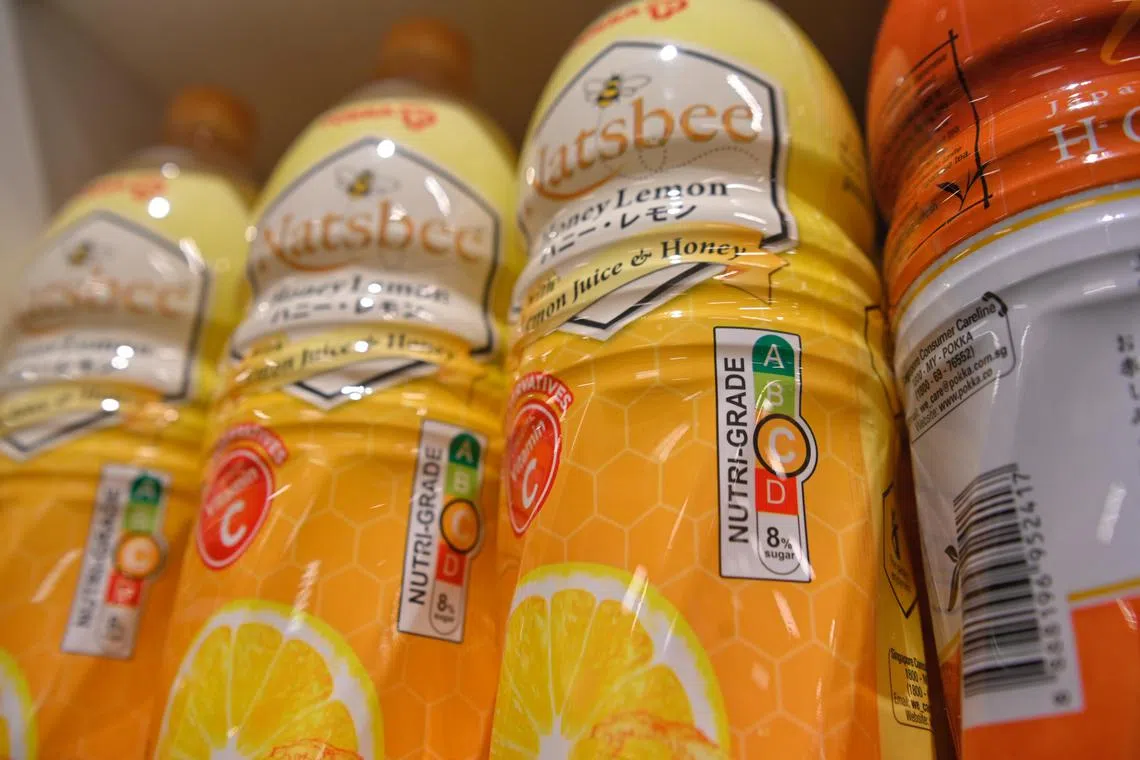Nutri-Grade labelling system steers consumers to opt for drinks with less sugar: Study
Sign up now: Get ST's newsletters delivered to your inbox

Drinks with the Nutri-Grade label seen on sale at FairPrice Xtra VivoCity, on Dec 2, 2022.
PHOTO: ST FILE
SINGAPORE - Nutri-Grade, the mandatory labelling system for pre-packaged beverages,
The Nutri-Grade mark comprises four grades – A to D – for classifying drinks, with D being the unhealthiest. The products include fruit juices and juice drinks, soft drinks, milk and yogurt drinks, and instant powdered beverages.
The Duke-NUS Medical School trial, which was conducted before the official implementation of the Nutri-Grade system in December 2022, involved 138 participants.
They were asked to purchase groceries the way they would in a typical weekly shopping run, with a minimum spend of $50. They had to buy at least one beverage.
The experiment was done on online grocery store NUSMart, which mimics real Internet-based grocery stores.
Participants were exposed to two different shopping experiences – one where beverages had the Nutri-Grade mark and one where they did not.
Dr Soye Shin, a health economist from the health services and systems research programme at Duke-NUS Medical School, as well as the first author and principal investigator of the study, said earlier in March that the results revealed that Nutri-Grade labelling was effective in increasing purchases of beverages that were rated A or B.
The findings were also published in the International Journal Of Behavioural Nutrition And Physical Activity in February.
“Compared with what was bought during the shopping experience without the Nutri-Grade labels, those bought with the Nutri-Grade labels had a reduced sugar content of 1.5g per serving,” said Dr Shin.
That amount translates to about 2.9g of sugar per 330ml can.
Commenting on how meaningful such a shift was, Professor Eric Finkelstein – from the same programme and senior author of the study – said the impact of the Nutri-Grade mark also depends on an individual’s dietary habits.
“If you’re someone who has a Coca-Cola here and there, it’s not going to make much of a difference. But if you’re a heavy drinker of sweetened beverages – that could be juices, soda or carbonated sports drinks – and you move from the Cs and Ds to the As and Bs consistently over the course of the year, these small changes can add up,” said Prof Finkelstein.
But the study showed that there were no significant differences in the total amount of calories, saturated fat or other nutrients present in the purchased goods – likely because beverages account for a small part of the total shopping basket.
It also revealed the limits of labelling only beverages in this manner, and given Singapore’s goal of reducing the incidence of diabetes and other non-communicable diseases, additional policies would be needed.
Prof Finkelstein said that even though Singapore has the Healthier Choice symbol for food, “it doesn’t help you differentiate between the Cs and the Ds, it just helps you identify which are the As”.
He pointed out that there are other well-accepted front-of-pack labels for food in the market that can help consumers make better choices.
“For example, if the goal is to reduce obesity rates, a label that focuses on calories is probably the best. But if the goal is to focus on overall nutritional quality, then the Nutri-Score system is pretty good because it considers more than just calories,” said Prof Finkelstein, referring to a nutrition label used in France, Germany and Spain which grades food from A to E.
The next step for the Duke-NUS team would be to evaluate the Nutri-Grade system’s effects using real-world consumer data. It is hoped that the research will provide more detailed evidence that can be used to guide refinement and expansion of the system.
“The Duke-NUS study affirms that the Nutri-Grade mark is a good tool in guiding consumers to identify and choose beverages lower in sugar,” said Mr Terence Ng, director of policy and strategy development at the Health Promotion Board.
“With the extension of these measures to freshly prepared beverages in end-2023, we aim to help Singaporeans reduce sugar consumption through beverages over time.”



